| Srl | Item |
| 1 |
ID:
059259
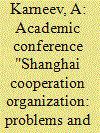

|
|
|
|
|
| Publication |
Oct-Dec 2004.
|
|
|
|
|
|
|
|
|
|
|
|
|
|
|
|
| 2 |
ID:
071801
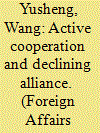

|
|
|
| 3 |
ID:
138737
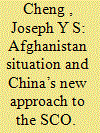

|
|
|
|
|
| Summary/Abstract |
This article examines China’s concern to prevent terrorism and maintain stability in Central Asia through the SCO. The situation in Afghanistan has raised concerns among SCO member countries and strengthened common interests to maintain the regional organization, regime stability, and economic co-operation within it.
|
|
|
|
|
|
|
|
|
|
|
|
|
|
|
|
| 4 |
ID:
106705
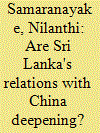

|
|
|
|
|
| Publication |
2011.
|
| Summary/Abstract |
During the past few years, Sri Lanka appears to have forged closer relations with China. Sri Lanka welcomed Chinese investment in building a port in Hambantota, arms from China for use in its civil war, and "dialogue partner" status in the Shanghai Cooperation Organization. Such high-profile moves have unnerved analysts fearing the rise of Chinese influence in the Indian Ocean region. A first-time, systematic analysis of the trends in Sri Lanka's economic, military, and diplomatic relations with China reveals that ties have indeed been strengthening. However, Sri Lanka is neither bandwagoning with nor balancing China, as structural realism predicts. More attention should be devoted to explaining the security thinking of small states that are not following such predictions in response to the emergence of a regional hegemon.
|
|
|
|
|
|
|
|
|
|
|
|
|
|
|
|
| 5 |
ID:
067093
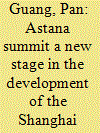

|
|
|
| 6 |
ID:
078866
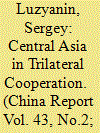

|
|
|
|
|
| Publication |
2007.
|
| Summary/Abstract |
The region, Central Asia, and the regional organisation, SCO, were of significance for China, India and Russia with respect to dealing with threats to security posed by non-state actors such as terrorists and drug-traffickers. The three could also cooperate with regard to energy resources, transport and investment in the region. However, competition could not be ruled out and hence it was necessary to structure their interaction in terms of 'cooperative competition' and well-coordinated trilateral interaction, for example, by each agreeing to specialise in a particular sphere or sector.
|
|
|
|
|
|
|
|
|
|
|
|
|
|
|
|
| 7 |
ID:
120958
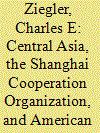

|
|
|
|
|
| Publication |
2013.
|
| Summary/Abstract |
This paper examines U.S. engagement in Central Asia over the past two decades, with specific reference to the Shanghai Cooperation Organization. While alarmist voices occasionally warn of the threat to American interests from China and Russia through the SCO, the organization's influence appears limited. Washington has engaged it only sporadically, preferring to conduct relations bilaterally with the Central Asian states.
|
|
|
|
|
|
|
|
|
|
|
|
|
|
|
|
| 8 |
ID:
082848
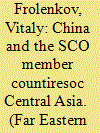

|
|
|
|
|
| Publication |
2008.
|
| Summary/Abstract |
The Shanghai Cooperation Organization (SCO) is gradually intensifying its focus on economics. The most likely explanation for this policy change is that China, the SCO's economic growth engine, needs lots of fuel to stay in the running, and this change of the Organization's thrust is fully supported by Central Asia and Russia with their abundant hydrocarbons.1 Significantly, experts must be right, we believe, arguing that the SCO may turn out to be short-lived as a regional alliance unless its members found common ground on energy from both the economic and political, even strategic, perspective
|
|
|
|
|
|
|
|
|
|
|
|
|
|
|
|
| 9 |
ID:
078078
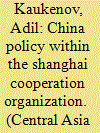

|
|
|
| 10 |
ID:
098974
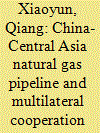

|
|
|
| 11 |
ID:
100346
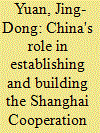

|
|
|
|
|
| Publication |
2010.
|
| Summary/Abstract |
In June 2001, China, Russia, Kazakhstan, Kyrgyzstan, Tajikistan, and Uzbekistan established the Shanghai Cooperation Organization (SCO). While the immediate focus of the organization was to combat the so-called 'three evils'-ethnic separatism, religious extremism, and international terrorism-the SCO's long-term viability and effectiveness in promoting regional stability and economic development depend on how member states build up common identity and cooperate on issues of mutual concern. This article looks at China's role in initiating the Shanghai-5/SCO structure within the broader framework of Beijing's foreign and security policy interests and priorities in Central Asia and seeks to examine both the prospects for and the potential obstacles to its efforts in achieving key objectives for this new regional organization: management of ethnic and religious unrest, including the fight against terrorism and separatism; maintenance of stable borders; development of energy resources; and promotion of economic prosperity. In addition, the article will also examine the extent to which Beijing has used the opportunity to exercise leadership and whether or not China can extend its influence to Central Asia using the SCO as a vehicle.
|
|
|
|
|
|
|
|
|
|
|
|
|
|
|
|
| 12 |
ID:
050949
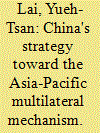

|
|
|
| 13 |
ID:
160608
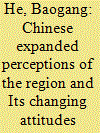

|
|
|
|
|
| Summary/Abstract |
The existing literature on the Indo-Pacific has largely focused on how and why the USA, Japan, Australia, India, and Indonesia have promoted the strategic concept of the Indo-Pacific, and how China has rejected it in the domain of maritime security. What has been overlooked, however, are dramatically expanded Chinese perceptions of the region and changing and complex Chinese attitudes and responses toward the Indo-Pacific. This essay aims to fill this gap by demonstrating how China has coopted certain components of the Indo-Pacific in its geoeconomic hegemonic project. This can be partially explained by unfolding and expanding Chinese perceptions of the region, characterized by geoeconomics and maritime/continental hybridity. This paper brings a missing perspective to the debate by highlighting China’s evolving, complex, and multifaceted approaches regarding the Indo-Pacific. It also offers a conceptual tool of a hybrid vision of the institutionalization of the Indo-Pacific for the enterprise of regional cooperation.
|
|
|
|
|
|
|
|
|
|
|
|
|
|
|
|
| 14 |
ID:
115508
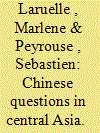

|
|
|
|
|
| Publication |
London, Hurst and Company, 2012.
|
| Description |
vii,271p.
|
| Standard Number |
9781849041799
|
|
|
|
|
|
|
|
|
|
|
|
Copies: C:1/I:0,R:0,Q:0
Circulation
| Accession# | Call# | Current Location | Status | Policy | Location |
| 056866 | 303.48/LAR 056866 | Main | On Shelf | General | |
|
|
|
|
| 15 |
ID:
082050
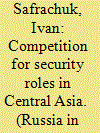

|
|
|
| 16 |
ID:
094367
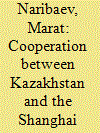

|
|
|
| 17 |
ID:
051793
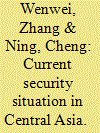

|
|
|
| 18 |
ID:
113382
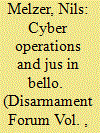

|
|
|
| 19 |
ID:
079701
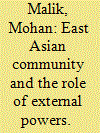

|
|
|
| 20 |
ID:
082846
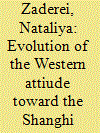

|
|
|
|
|
| Publication |
2008.
|
| Summary/Abstract |
Central Asia has not been a priority object of the foreign-policy course of West European countries or the United States until recently. The role of the United States in the region, right up to the time of the Clinton administration, was confined to individual, sometimes isolated, measures, including traditional American steps to promote democratization, market reforms, cooperation programs with the Northern Alliance, and counteracting the proliferation of armaments, terrorism and drag trafficking
|
|
|
|
|
|
|
|
|
|
|
|
|
|
|
|